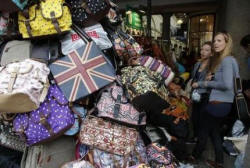|
 Euro
zone retail sales much stronger than expected in August Euro
zone retail sales much stronger than expected in August
 Send a link to a friend
Send a link to a friend
[October 03, 2014]
By Jan Strupczewski
BRUSSELS (Reuters) - Euro zone retail sales
increased much more than expected in August, data showed on Friday,
pointing to stronger demand from households that could help economic
growth in the third quarter.
|
|
 The European Union's statistics office Eurostat said retail sales
in the 18 countries sharing the euro rose 1.2 percent month-on-month
in August for a 1.9 percent year-on-year gain. The European Union's statistics office Eurostat said retail sales
in the 18 countries sharing the euro rose 1.2 percent month-on-month
in August for a 1.9 percent year-on-year gain.
Economists polled by Reuters had expected a 0.1 percent monthly and
a 0.5 percent annual rise after sales contracted 0.4 percent
month-on-month in July and rose 0.5 percent on the year.
"August's jump in retail sales fuels hopes that consumer spending
could make a decent contribution to euro zone GDP growth in the
third quarter," said Howard Archer, economist at IHS Global Insight.
"Retail sales volumes were up by 0.6 percent in the three months to
August compared to the three months to May. Barring a very sharp
correction in September, retail sales volumes look likely to have
grown by around 0.7 percent quarter-on-quarter in the third
quarter," Archer said.

Although volatile, retail sales data is a proxy for household
demand, a central element of the euro zone's economic recovery that
stalled in the second quarter.
Eurostat data showed sales of non-food products and fuel at petrol
stations contributed most to the monthly rise of the index in
August, with the euro zone's biggest economy Germany reporting the
biggest gain of 2.5 percent.
"It may be that retail sales were lifted in August by people
determined to enjoy their summer holidays after a difficult year.
There may also have been a boost to retail sales coming from
squeezed consumers looking to make the most of the summer sales in
some countries," Archer said.
Economists said that among other reasons for the improvement could
be the very low euro zone inflation shoring up purchasing power, and
the fact that over the 14 months to August, unemployment in the euro
zone declined by 768,000 people.
[to top of second column] |

Economists also point to the strong month-on-month growth in
spending in Germany, where unemployment is very low and real wages
are good, compared to other countries.
Other economists, however, preferred to point out risks, saying this
rebound might not last.
In annual terms, sales of non-food products played an even bigger
role as their 3.6 percent year-on-year rise offset a 0.2 percent
fall in the sales of food and the same drop in the sales of petrol.
Both Germany and France, the second biggest euro zone economy,
recorded hefty gains of 3.1 and 2.1 percent respectively.
(Editing by Mark Heinrich)
[© 2014 Thomson Reuters. All rights
reserved.] Copyright 2014 Reuters. All rights reserved. This material may not be published,
broadcast, rewritten or redistributed.
 |